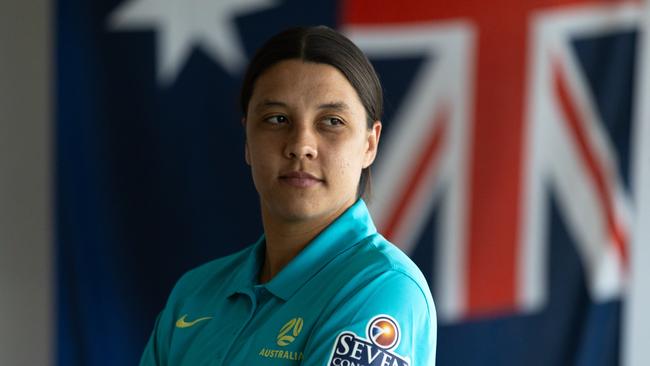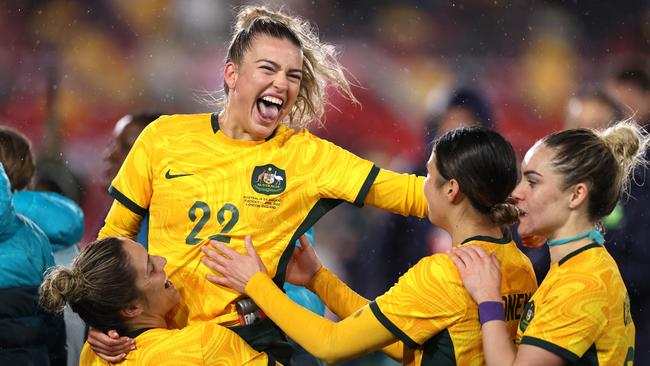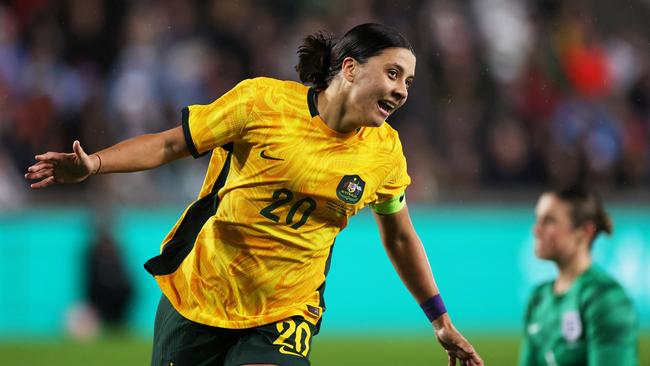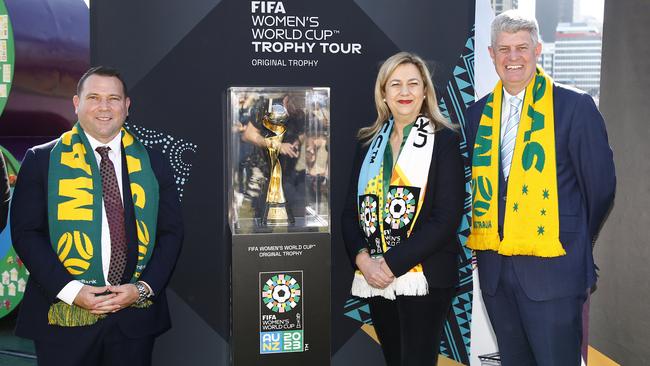The Matildas have become big business for Australian soccer
Stars like Sam Kerr scoring goals on the field have brought in big money in support of the women’s game off it. Football Australia hopes the Women’s World Cup means the sport can now cash in.

It is a golden era for women’s sport, and soccer’s national team, the Matildas, is at the forefront of the interest that the corporate sector is finally showing.
In a little less than two weeks, the Matildas will take to the field for the team’s first match in the 2023 Women’s World Cup that Australia is hosting with New Zealand.
Led by superstar captain Sam Kerr, the Matildas will play Ireland on July 20 in front of an 80,000 sold-out capacity crowd at Sydney’s Accor Stadium, Olympic Park.
Organisers of the tournament, which includes Commonwealth Bank as a sponsor (it also sponsors the Matildas), are promising a cumulative worldwide television audience of two billion for the month-long event.
Locally, mobile phone company Optus has paid more than $30m for the Australian broadcast rights – some matches have been on-sold to Seven West Media to be shown on free-to-air TV – and big brands like Qantas, Lego, Nike, Cadbury, Priceline and Spanish car company Cupra have paid up to be associated with the Matildas.
Kerr herself is about to release a book and stars in a Commonwealth Bank advertisement that has been running in the lead-up to the tournament, which is targeting 1.5 million in ticket sales up to the August 20 final in Sydney.

Therefore, these are relatively heady days for soccer in Australia, which seems to perennially lurch from triumph to disaster on and off the field – and often within the space of weeks and sometimes even days between each high and low.
So can the Matildas help save soccer and finally put the world game on its firmest ever footing in Australia?
Football Australia chief executive James Johnson has high hopes for the Women’s World Cup and is optimistic about the legacy it will provide for his sport.
“Women’s sport is growing but this is the time for women’s football in Australia and Australian football,” Johnson tells The Weekend Australian.
“I think what you’re going to see is the giant awakening, and everyone’s been waiting for this. And I’m hoping that the Women’s World Cup is the springboard to that.”
For the matches in Australia (the games are roughly split evenly with New Zealand), Johnson says Matildas group stage games in Sydney, Brisbane and Melbourne are sold out, and ticket sales have been strong in most home cities for other matches.
While the men’s national team, the Socceroos, had a strong World Cup in Qatar late last year, qualifying for the knockout stage for only the second ever time in history, hopes are even higher for the Matildas who are ranked 10th in the world.
Having a global superstar like Kerr has helped build the Matildas into a commercial success ahead of the World Cup.
“It is fair to say that the brand has exploded in the past three years, and we’re hoping that takes another level of expansion both in Australia and abroad as well,” Johnson says.
What that means is hard to quantify, given the gaps in international match scheduling, which tend to peak around World Cup and Olympic tournaments during a four-year cycle, but Johnson says soccer now has two strong brands in the Socceroos and Matildas that appeal to both commercial partners and the wider public.
“When the Matildas play and they’re on Channel 7, there’s going to be millions and millions watching. We know when the Socceroos are playing big matches there are millions and millions of watching,” he says.

“And we know that there are millions and millions playing the sport. And so there is a logic to how we’re trying to create two big brands that are entrenched with the big community that we have.”
Johnson says that in 20 years’ time Australia will look back on the Women’s World Cup with memories as fond as they have for the 2000 Sydney Olympics.
But there is also a need for the sport to not have a hangover after its big event, especially in a crowded market dominated by sporting giants such as Australian rules football’s AFL, rugby league and cricket.
With the A-League men’s and women’s competitions now privately owned by clubs and private equity firm Silver Lake, Johnson says the way the FA will maintain relevance and commercial interest is by playing and hosting more big Matildas and Socceroos matches and tournaments.
“We’ve got two strong brands that we want playing at home or in time zones that are good for Australian audiences,” he says.

“So if we’re able to bring content to Australia – obviously the World Cup is a crown jewel – and we’re bidding for the Women’s Asian Cup and one day we should bid again for the men’s World Cup, and there’s Olympic qualifiers and other games, then the more we have of this then that’s the way I believe we can keep the interest in the sport high.”
Johnson says FA’s commercial income should now be sufficient to make it a $100m revenue business annually, although that is still less than the governing bodies of most of the other big sports.
FA has also talked up the roughly $300m of state, federal and local government funding it has or will receive in total for what it calls the “legacy” of hosting the World Cup. About one third of that has been spent on a new “Home of the Matildas” dedicated women’s soccer facility in Melbourne.
The other big sports still generally get more government attention and support, despite soccer’s huge grassroots player numbers. For example, the AFL has attracted $240m from the federal government and $375m from the Tasmanian government for a planned stadium in Hobart.
Johnson says his sport needs to play its own game.
“We’ve got to stop trying to be AFL and NRL and we’ve got to be football. We’ve got to look at what is intrinsically strong about the sport. We went to Beijing (where the Socceroos played Argentina in June) … and what is interesting about that is it was a message we can send to government (that) we can be a good partner in places like that.
“The Socceroos brand was played in front of 100 million Chinese watching on TV. And we heard pockets of the crowd even chanting for Australia during the match, right at a time when relations between China and Australia haven’t been good.
“We’ve got to use the strongest parts of our game to our advantage.”
As for what happens on the field, the Matildas playing at home in their biggest tournament provides the best opportunity yet for soccer to make its mark.
“We don’t want to put too much pressure on the team, but we just want them to stay in the tournament as long as possible,” says Johnson.
“We know what we are up against. But, you know, on our day we can beat the best teams in the world.”






To join the conversation, please log in. Don't have an account? Register
Join the conversation, you are commenting as Logout